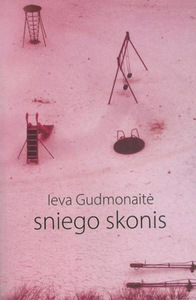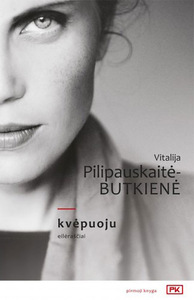Young women's writing: poetry of the senses 3
In brief: It is good to know that poetry books published by young writers were included in the list of top 12 most creative books of 2015. It is the creative verdure, which would code interesting and innovative poetry forms and contents of meaning that literary field lacks, especially poetry. Therefore, new names and the authors' first books are not only expected, they also intrigue. One of the young poets invites to creatively experience longing of home and the other one to know the woman's world.
Ieva Gudmonaitė. The Taste of Snow (Sniego skonis. Kaunas: Kauko laiptai, 2015)
Ieva Gudmonaitė (Ishvari Prema) is a multifaceted personality - a poet, a prose writer and also a painter. She does many things, but she also has a clear creative strategy - the ease of thought in her prose, poems or paintings.
I this case, I. Gudmonaitė's poetry collection The Taste of Snow is dominated by her authentic experiences; mythological and cultural narratives intertwine in her work, together with fragments from travel diaries and contemplation of natural images. However, the main idea of the book is to connect personal experiences to other kind of experience - religion.
The most pronounced motif that reader will recognize in the book The Taste of Snow is home, the consistent development of which is taking place throughout the entire chapters of the book ("Home", "The First Exit", The Second Exit" and "First Turn Behind the Snowdrift").The subject in the poems chooses to construct home that would be both real and imagined.
Vitalija Pilipauskaitė-Butkienė. I am Breathing (Kvėpuoju. Vilnius: Lietuvos rašytojų sąjungos leidykla, 2015)
We could understand her poetry book as a light breathing. And it does not matter who would be the reader - a man or a woman. V. Piliauskaitė-Butkienė is not only interested in femininity. She also focuses on the connection between man (child) and woman (mother).
Through her poems V. Pilipauskaitė-Butkienė builds bridges and makes connections between family and kindred, between mother and children and between family and the women of the family. That is how the broad family field is created, allowing the subject to reflect femininity. For example, poems “My First Child's Poem”, “My Second Child's Poem” and “My Third Child's Poem” analyze the connection between mother and child; in other series "My Women" V. Pilipauskaitė-Butkienė turns to family traditions and in the poem "Glass Country" author communicates, seeks a dialog with Vanda Juknaitė's short story “Glass Country.”


